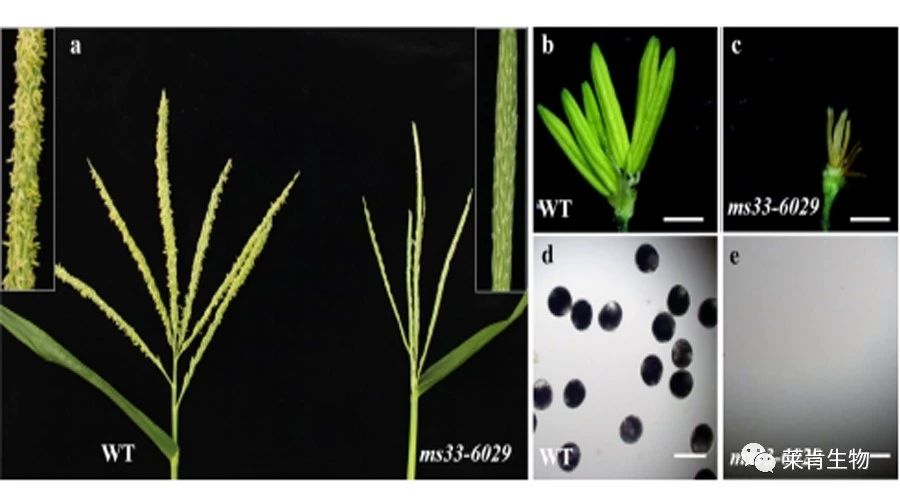
Theoretical and Applied Genetics | 克隆玉米雄性不育基因ZmMs33

对于商业化杂交制种来说,雄性不育基因至关重要。最近,北京科技大学教授、北京首佳利华科技有限公司科学家万向元领衔的研发团队通过图位克隆方法获得了一个玉米隐性雄性不育基因ZmMs33。
ms33是一个玉米隐性雄性不育突变体,植株产生的很小的浅黄色花粉,且完全不育。通过图位克隆,研究人员发现ms33突变表型是由于GRMZM2G070304基因变异导致。该基因编码一个新的sn-2家族甘油-3-磷酸酰基转移酶GPAT(sn-2 glycerol-3-phosphate acyltransferase),互补试验和基因敲除试验进一步证明了基因控制育性的功能。水稻OsGPAT3与ZmMs33具有进化保守性。
该研究预示着GPAT在作物育性控制上的重要作用,也为玉米雄性不育系培育提供了新的途径。ZmMs33相关专利《玉米花粉发育调控基因Ms33的DNA序列及其编码蛋白》已于2016年10月9日申报。
Theor Appl Genet. 2018 Mar 15.
Map-based cloning and characterization of Zea mays male sterility33 (ZmMs33) gene, encoding a glycerol-3-phosphate acyltransferase.
Author
Ke Xie, Suowei Wu, Ziwen Li……Shuangshuang Liu, Jinping Li, Xiangyuan Wan*
*: Advanced Biotechnology and Application Research Center, School of Chemistry and Biological Engineering, University of Science and Technology Beijing; Beijing Engineering Laboratory of Main Crop Biotechnology Breeding, Beijing Solidwill Sci-Tech Co. Ltd, China.
Abstract
Genetic male sterility has been widely studied for its biological significance and commercial value in hybrid seed production. Although many male-sterile mutants have been identified in maize (Zea mays L.), it is likely that most genes that cause male sterility are unknown. Here, we report a recessive genetic male-sterile mutant, male sterility33 (ms33), which displays small, pale yellow anthers, and complete male sterility. Using a map-based cloning approach, maize GRMZM2G070304 was identified as the ms33 gene (ZmMs33). ZmMs33 encodes a novel sn-2 glycerol-3-phosphate acyltransferase (GPAT) in maize.A functional complementation experiment showed that GRMZM2G070304 can rescue the male-sterile phenotype of the ms33-6029 mutant. GRMZM2G070304 was further confirmed to be the ms33 gene via targeted knockouts induced by the clustered regularly interspersed short palindromic repeats (CRISPR)/Cas9 system. ZmMs33 is preferentially expressed in the immature anther from the quartet to early-vacuolate microspore stages and in root tissues at the fifth leaf growth stage. Phylogenetic analysis indicated that ZmMs33 and OsGPAT3 are evolutionarily conserved for anther and pollen development in monocot species.This study reveals that the monocot-specific GPAT3 protein plays an important role in male fertility in maize, and ZmMs33 and mutants in this gene may have value in maize male-sterile line breeding and hybrid seed production.


